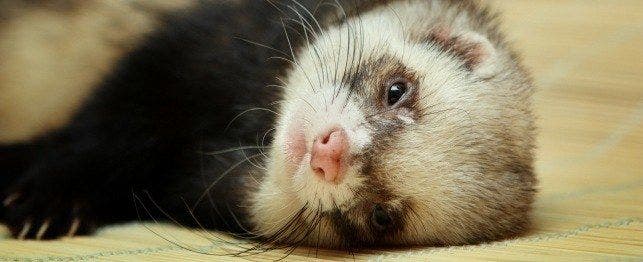
Laws That Prohibit Ferrets
California, Hawaii and New York City are the major battlefields in the war against keeping ferrets as pets. But ferret partisans are working hard to defeat the last of what they consider arcane and unenforceable bans.
In California and Hawaii, ferrets are classified as wildlife and outlawed as pets. In the last two California legislative sessions, legalization bills passed the state assembly with the blessing of the Department of Fish & Wildlife. But each time the measures were shelved in the appropriations committee.
However, Jeane Carley, spokesperson for Californians for Ferret Legalization, says she is hoping that new appointments to the appropriation committee next year will enable the legislation to move ahead.
In New York City, a Board of Health ruling in June 1999 placed ferrets in the same category of animals that are “wild, ferocious, fierce, dangerous or naturally inclined to do harm,” lumping them with tigers, lions, and elephants.
In response, Gary Kaskel, head of the city’s Friends of Ferrets, filed a civil suit in New York State Supreme Court challenging the City Department of Health’s authority to ban ferrets over the New York State law that makes them legal. The first step in the proceedings will be an Oct. 20 hearing during which the four members of the Board of Health are expected to appear in court to give reasons for their action.
“There was no discussion,” says Kaskel. “The Department of Health wrote a recommendation and the board rubberstamped it.”
Dr. Saul Farber, a Board of Health member, refused to comment on the situation, referring all inquiries to the Department of Health. A spokesman for Department of Health commissioner Neal Cohen said there was nothing new in the ban. “Ferrets have been illegal in New York City for 40 years.”
Yet a quick survey of the city’s pet stores shows all of them carry a good supply of ferret food, vitamin supplements and cages. Kaskel estimates the city’s population of pet ferrets to be at least 15,000.
At a hearing prior to the board’s decision, the ASPCA, the Humane Society, and The Animal Medical Center, a research and teaching veterinary hospital, all favored repealing the ferrets’ classification.
“We do not believe that ferrets today should be considered ‘wild’ animals,” read the ASPCA statement. Ferrets, it noted, are descendants of European stoats and were domesticated more than a thousand years ago. Moreover, they can now be vaccinated against rabies and other diseases just as dogs or cats.
“According to the (Health) Department’s own statistics for calendar year 1998, there were only three reported bites by ferrets, whereas reported cases involving dogs and cats numbered 6,568 and 1,131 respectively,” the statement said.
City Council member Kathryn Freed, who earlier this year introduced legislation to legalize ferret ownership, urged the board to vote down the prohibition. She even called on pet owners to protest at City Hall with their ferrets. That is, she said, until rumors circulated that the cops might confiscate the animals. She then invited those who had brought their animals to the hearing to stow them in her office for the session. “I had a lot of ferrets in there,” she says, calling the board’s decision “mind-boggling.”
Freed also warns that the situation “might be amusing except for the fact that the ruling could give landlords an excuse to get people who owned ferrets out of their apartments. The day after the ruling some ferrets had been dumped in Central Park.”
Supreme Court Judge Richard Braun also expressed “distress” about the board’s decision. Ferret owners, he wrote, appeared to be being treated differently than dog or cat owners. “And anyone who has been a pet owner, and this court has been, although not of a ferret, (knows) pets are members of the human owners families.”
The Board of Health’s ruling also includes “any member of the family Iguanidae, including the green or common iguana.” Whether the owners of those pets will be heard from remains to be seen.